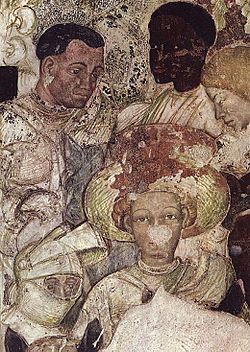


The Palazzo Ducale di Mantova ("Ducal Palace") is a group of buildings in Mantua, Lombardy, northern Italy, built between the 14th and the 17th century mainly by the noble family of Gonzaga as their royal residence in the capital of their Duchy. The buildings are connected by corridors and galleries and are enriched by inner courts and wide gardens. The complex includes some 500 rooms and occupies an area of c. 34,000 m2, which make it the sixth largest palace in Europe after the palaces of the Vatican, the Louvre Palace, the Palace of Versailles, the Royal Palace of Caserta and the Castle of Fontainebleau. It has more than 500 rooms [1] and contains seven gardens and eight courtyards.[2] Although most famous for Mantegna's frescos in the Camera degli Sposi (Wedding Room), they have many other very significant architectural and painted elements.
The Gonzaga family lived in the palace from 1328 to 1707, when the dynasty died out. Subsequently, the buildings saw a sharp decline, which was halted in the 20th century with a continuing process of restoration and the designation of the area as museum. In 1998, a hidden room was discovered by Palace scholars, led by musicologist Paula Bezzutti. The room is thought to have been used for performances of Monteverdi's music in the late 16th century.[3]
- ^ Municipality of Mantua. Palazzo Ducale.
- ^ Alberto Angela (March 12, 2019). St 2019 Episode of 12/03/2019. Wonders - The peninsula of treasures. Rai 1. Event occurs at 00:18:40. Retrieved March 14, 2019.
- ^ Howard Goodall, Big Bangs, 2000